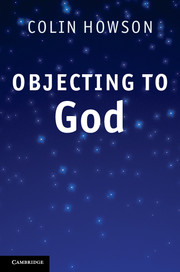Book contents
- Frontmatter
- Contents
- Preface
- Acknowledgments
- Chapter 1 Of human bondage
- Chapter 2 God unlimited
- Chapter 3 How to reason if you must
- Chapter 4 The well-tempered universe
- Chapter 5 What does it all mean?
- Chapter 6 Moral equilibrium
- Chapter 7 What is life without Thee?
- Chapter 8 It necessarily ain't so
- Bibliography
- Index
- References
Chapter 7 - What is life without Thee?
Published online by Cambridge University Press: 05 June 2012
- Frontmatter
- Contents
- Preface
- Acknowledgments
- Chapter 1 Of human bondage
- Chapter 2 God unlimited
- Chapter 3 How to reason if you must
- Chapter 4 The well-tempered universe
- Chapter 5 What does it all mean?
- Chapter 6 Moral equilibrium
- Chapter 7 What is life without Thee?
- Chapter 8 It necessarily ain't so
- Bibliography
- Index
- References
Summary
‘What a piece of work is a man! How noble in reason! How infinite in faculty!’
The watchmaker's return
William Paley's celestial Watchmaker seems to have returned after an absence of two centuries, to mixed fortunes. One of the recent arguments from design, that based on the so-called fine-tuning life of some fundamental physical constants, founders on the following objections: an extremely small prior probability merited by the God of theism in the light – if that is the right word – of the Problem of Evil; the fact that it is not obviously unreasonable to place a substantial probability on the hypothesis that a future theory will fix those values; and the sheer incoherence of computations of the ‘chances’ of fine-tuning were there no fine-tuner. But where what is to be explained is the existence of life, where even the assembling of atoms into amino acids is a highly complex affair, it is not clear that comparable objections achieve so much purchase. Put simply, the only eligible explanatory theory would be evolutionary biology, but that theory is in principle incapable of doing the job – or so it is claimed even by people having no obvious axe to grind on behalf of God.
- Type
- Chapter
- Information
- Objecting to God , pp. 171 - 193Publisher: Cambridge University PressPrint publication year: 2011



